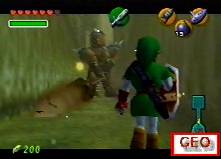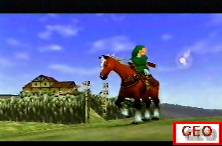


|


      
|
Yes, for those of you who have been complaining, Zelda does use an engine based on Mario 64. The 3D movement works much better in this world than in Mario's, though; fields areas are enormous, dungeons are claustrophobic, paths intertwine horizontally and vertically. Logic is no longer that oddly skewed video game facsimile; monsters are larger, attack more memorably, and fall to more interesting tactics. As in all Zelda games, the key to fighting bosses is not merely twitch skills, but figuring out what to do; that concept is raised to an art form here. Boss fights are (oddly enough) both logical and dramatic, and after figuring out a particularly difficult one you can't help but feel a bit self-righteous in your cleverness. Ocarina of Time, technically the fifth game in the series, appears to be a remake of the SNES version, which was in turn a remake of the NES original (both the NES and SNES versions had true sequels, oddly enough; apparently the pattern is game, sequel to game, remake, sequel to remake, etc.). In the classic story, you take on the role of a young orphan named Link who sets forth, or rather is called forth, on a quest to save the land of Hyrule from a demonic creature known as Ganon. Well, not quite. As A Link to the Past did for the original, Ocarina of Time fleshes out the mythology of Hyrule considerably; deep within the aptly named Kokiri Forest is a village of elf-like people known as the Kokiri, a magical race who does not naturally grow old, and who are said to die if they leave the forest. Each is paired at birth with a fairy, except one boy named Link. They are guarded by the great Deku tree, who sends link on a journey with its dying breath to stop the magic that has cursed it from enveloping the land. Along the way he meets a young princess named Zelda and an imposing figure known as Ganondorf, King of Thieves who can best be described as a cross between Don Corleone and Prince Malagant. Players of the SNES version may remember a passing mention of a certain Ganondorf Dragmire, leader of a local thief group, who became the pig-like demon Ganon when he entered the sacred realm; well, now you get to meet him. The fact that you do get to see him before the final battle is a good idea, as it not only adds to the character's sense of foreboding but he is an active part of the storyline this time around, similar to the wizard Agahnim (who later turned out to be Ganon, anyway). Supporting characters include Malon and Talon (who I suspect of being poorly translated versions of Marin and Tarin, from the GB version), Saria (a Kokiri girl who introduces you the powers of the Ocarina), Impa (Zelda's caretaker), Epona (the horse you've heard so much about ^_^) and the enigmatic Sheik. Also hanging around are the Zora (good guys this time around), and the Gorons, an odd species of rock-eaters that live up on Death Mountain. The storyline may seem a little thin, but only because of the great advances made in that area in recent years (most notably Blood Omen, Metal Gear Solid and the last two Final Fantasy games). I doubt this was unintentional; it would be totally against the spirit of the series to have, for example, Link kill his father in the opening sequence and spend the rest of the game discussing the numbing effects of violence. Like the previous games, Zelda is high-spirited, but rarely syrupy, and the final battle is carried out with the appropriate amount of gravity. Somewhere between the very disparate tones of Brave Fencer Musashi and Legacy of Kain is an energetic, enjoyable atmosphere that gets serious when it needs to, and this is where Zelda takes place. The graphics and sound are consistent with this theme, more adventurous than happy. The fact that I haven't even mentioned the gameplay itself until the fifth paragraph can be taken as many things, but I'll leave that to you. The controls are consistent in both the overworld and the dungeons, and are, for lack of a better word, perfect. Complete freedom of movement is a prerequisite, but here it's done like never before; jumping and climbing are both simple techniques that are used constantly, so the game does them automatically for you, leaving the buttons open for the more important functions. Like the SNES version, there is a generic Action button that does pretty much everything other than attack or use items, and the readout of what it will do at any given time is often helpful and never cumbersome. You can equip three items at once (a HUGE improvement over the constant menu-juggling of the last two games), and many are far more interesting in 3D; in particular, the slingshot and the arrows speak to the sniper in us all, and the boomerang and the hookshot are simply a joy to use, regardless of whether or not it's actually necessary. The dungeons themselves defy description; think of every idea used in the previous games, plus a few from other games, plus a few new ones, and you'll have a pretty good idea. With the exception of the first, the dungeons are much larger than before and much more varied, not to mention harder; however, buy a hint book and you risk taking shit from all your co-workers for cheating. At least that's what happened to me. Then again, I was asked to review the game since I'm the only one who's beaten it, which proves the old maxim: winners never cheat, but cheaters often win. The most noticeable addition is Z-Targeting, which allows Link to "lock on" to an opponent, automatically putting him in the position to attack and defend as if in a one-on-one duel; techniques such as side jumps, backflips and leaping slashes are reminiscent of Nightmare Creatures and Tomb Raider, but much more intuitive and refined; in all fairness, though, I must note that Link's breasts are much smaller than Lara's. Regardless, the sword-to-sword battles are very dramatic now (particularly the 6th dungeon's mid-boss), looking much the way they would in, dare I say it, a movie. I know that sentence will cause Officially Hardcore gamers to cringe in disgust, as anything common in movies, such as character depth, suspense, multilayered plots, semi-realistic fights, etc. automatically translates into bad gameplay, but it holds true, making Zelda that rarest of things: a game that plays fluidly but is also fun to watch. If there was one truly redeeming quality in all Wipeout games, it would be speed. Wipeout 64 is fast, very fast. Depending on hovercraft class and team (of which there are 4 classes and 5 teams), racing in Wipeout 64 can reach almost intolerable (and sometimes even uncontrollable) speeds. Controlling your hovercraft is the key to sustaining the adrenaline rush this speed brings, and at some speeds it is extremely challenging. But, with challenge comes victory, and all of it's rewards. This in it's own right offers a breathe of life to Wipeout 64 that most racers can't offer. There are only nine "official" dungeons (compared the the SNES version's thirteen), but the game is longer nonetheless, even if you don't bother with the secrets. The only reason I finished the game is because I didn't bother with that stuff (I enjoy the dungeons too much to run around looking for things to trade in the overworld, at least the first time through), so if there's any item that isn't absolutely essential to finishing the game, you can be fairly sure I missed it. So, depending on your perspective, Zelda either has very high replay value for the genre or is absurdly long. It's what the corportate types call a win-win situation. It's been noted that such comparisons are irrelevant, but before either was out, people were prophecizing a battle between Metal Gear Solid and Ocarina of Time; the only reason I can give for such comparisons is that both games came out at roughly the same time, for competing systems, and each was, in my humble opinion, the best game its respective system had ever seen. And, truth be told, Zelda does fall behind MGS in a couple of areas, namely pace and storyline. Both of these "failings" are probably intended by the developers, but they do warrant some relevant comparisons. The night I got MGS, I played it for literally ten hours straight, and I only stopped then because I lost a lot of progess dying in the torture scene. There are no breaks in MGS, no times when you think, "Ok, the cool part is over, I'll get back to this in the morning". One unintended result of this is the prevalent bullshit complaints that it was too short; Zelda doesn't keep the pressure on nearly as much. It's much less linear, and you have to go to the plot, the plot doesn't find you. As for storyline, I won't repeat my earlier comments, but I should mention that by the end of MGS, I didn't care about the play mechanics (which were excellent), I just wanted to see how everything played out. I never got that feeling with Zelda. Ultimately, though, the truth is revealed indirectly by the public comparisons of these games; when MGS came out, many doubted that Zelda could possibly be better. No one has even mentioned MGS since Zelda hit stores. The Legend of Zelda: Ocarina of time is the best ever seen in the Action/RPG subgenre, the larger Adventure genre, or the N64, and probably the best video game ever made. How appropriate that, eleven years after the release of the original, Shigeru Miyamoto tops himself once again. Peter the Malcontent
|

